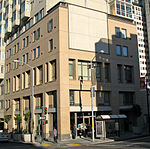Hungry i
1950s in California1960s in CaliforniaComedy clubs in CaliforniaDefunct nightclubs in CaliforniaFormer music venues in California ... and 6 more
History of San FranciscoMusic venues in San FranciscoNightclubs in San FranciscoNorth Beach, San FranciscoSex industry in San FranciscoStrip clubs in the United States

The hungry i was a nightclub in San Francisco, California, originally located in the North Beach neighborhood. It played a major role in the history of stand-up comedy in the United States. It was launched by Eric "Big Daddy" Nord, who sold it to Enrico Banducci in 1951. The club moved to Ghirardelli Square in 1967 and operated mostly as a rock music venue until it closed in 1970.The name of the nightclub was reused later as a strip club in San Francisco, from the late 1960s until 2019.
Excerpt from the Wikipedia article Hungry i (License: CC BY-SA 3.0, Authors, Images).Hungry i
Kearny Street, San Francisco
Geographical coordinates (GPS) Address Nearby Places Show on map
Geographical coordinates (GPS)
| Latitude | Longitude |
|---|---|
| N 37.796242 ° | E -122.405133 ° |
Address
Golden Coin Building
Kearny Street 900
94133 San Francisco
California, United States
Open on Google Maps








